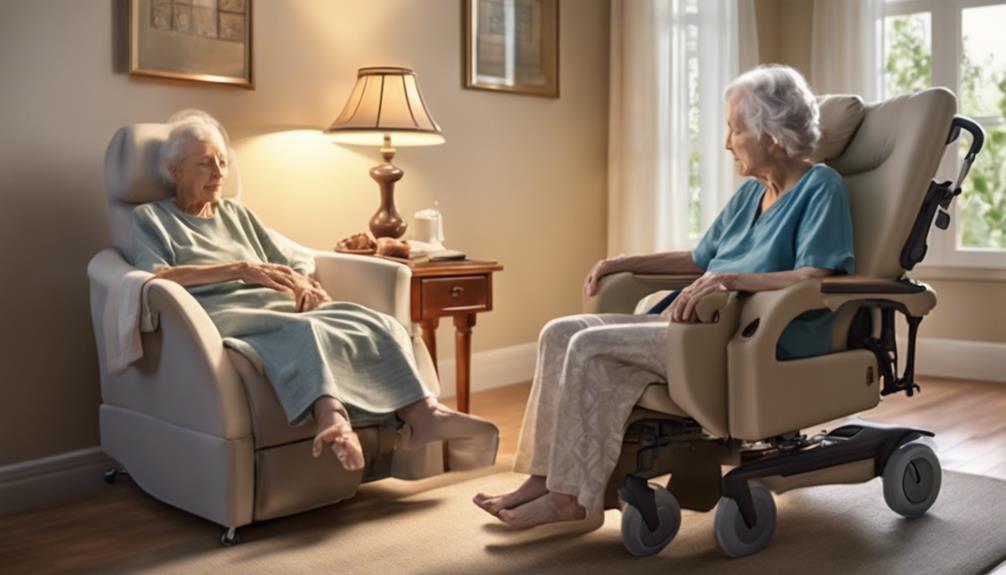When navigating the challenging process of organizing care for those in the final stages of dementia, imagine a resource that focuses on their well-being and dignity.
While the journey may seem daunting, understanding the intricacies of creating a comprehensive care plan can significantly impact the quality of life for those you care for.
By exploring key considerations, addressing medical needs, and integrating emotional and spiritual support, you will be equipped to provide holistic care that honors the unique preferences and needs of dementia patients.
Key Takeaways
- Proactive care planning empowers dementia patients to make end-of-life decisions.
- Collaborate with healthcare providers to tailor symptom management and support.
- Address emotional needs through empathy, engagement, and caregiver support.
- Integrate spiritual care sensitively to enhance peace and well-being in end-of-life planning.
Importance of Care Planning for Dementia Patients
When caring for dementia patients, understanding the importance of proactive care planning is vital to ensure their end-of-life wishes are respected and honored. Advance care planning allows individuals with dementia to make decisions about their care while they still have the capacity to do so. Documenting preferences for medical care and decision-making not only empowers the patients but also serves as a guide for healthcare providers and caregivers, helping them provide the best possible support tailored to the individual's needs.
In the context of dementia care planning, it's essential to consider cultural and spiritual needs to ensure holistic and respectful end-of-life care. By incorporating these aspects into the care plan, you can create an environment that honors the person's beliefs and values. Effective communication strategies, such as understanding non-verbal cues and individual preferences, are integral in delivering person-centered care that respects the dignity and autonomy of individuals with dementia as they navigate this challenging phase of life.
Addressing Medical Needs in Care Planning

To ensure comprehensive end-of-life care for dementia patients, it's crucial to address their medical needs effectively, including symptom management, pain relief, and coordination with healthcare professionals for optimal support. When developing a care plan, incorporating advance directives specific to medical interventions can provide clarity on the patient's preferences. Medical needs in dementia care may encompass managing infections, addressing nutritional challenges, and monitoring overall health to promote comfort and well-being.
Collaborating closely with healthcare professionals is essential to ensure that medical needs are met promptly and appropriately. Regular consultations with doctors, nurses, and specialists can help tailor the care plan to the evolving requirements of the patient. By staying vigilant and proactive in addressing medical concerns, you can enhance the quality of life for individuals with dementia as they approach the end of life. Remember that a well-rounded care plan not only considers emotional and social support but also prioritizes the management of medical needs to provide holistic and compassionate care.
Considering Emotional Support in Care Planning
Considering emotional support in care planning for dementia patients involves creating a nurturing environment that prioritizes psychological and spiritual well-being. Here are four key ways to provide emotional support for individuals with dementia in end-of-life care:
- Comfort and Empathy: Offering comfort through gentle gestures, soothing words, and a compassionate presence can help ease anxiety and promote emotional well-being.
- Reassurance and Understanding: Providing reassurance and understanding to dementia patients can enhance their sense of security and peace during this challenging stage.
- Quality of Life Enhancement: Engaging individuals with dementia in activities like music therapy and reminiscence can improve their quality of life and bring moments of joy and connection.
- Support for caregivers: Encouraging caregivers and family members to express their emotions, seek support, and take care of themselves can create a more supportive and understanding care environment for both the patients and those caring for them.
Integrating Spiritual Care in End-of-Life Planning

Integrating spiritual care into end-of-life planning for dementia patients involves addressing their religious beliefs, values, and existential concerns with compassion and sensitivity. Providing comfort, peace, and support to individuals with dementia as they approach the end of life is crucial.
Spiritual care encompasses prayers, rituals, sacred readings, and discussions to help patients discover meaning and purpose during this challenging period. It acknowledges the significance of spiritual well-being in improving overall quality of life and fostering a sense of connection and transcendence.
By integrating spiritual care into end-of-life planning for dementia patients, you can offer emotional and existential support for both the individual and their caregivers. This approach not only aims to bring solace to those with dementia but also seeks to create a space for reflection, peace, and spiritual growth during this delicate phase.
Embracing spiritual care can profoundly impact the journey towards the end of life, providing avenues for comfort and deeper understanding.
Practical Guidance for Care Plan Implementation
When developing a care plan for dementia patients, ensure that it comprehensively outlines their medical, emotional, and spiritual preferences. Implementing the care plan requires attention to detail and sensitivity to the individual's specific needs. Here are some practical guidance tips for effective care plan implementation:
- Incorporate Advance Directives: Ensure that the care plan includes the individual's wishes regarding medical treatment and end-of-life care.
- Appoint Healthcare Proxies: Designate trustworthy individuals to make healthcare decisions on behalf of the dementia patient if they become unable to do so.
- Discuss End-of-Life Wishes: Have open conversations about the person's preferences for end-of-life care, including their values and beliefs.
- Document Preferences for Pain Management and Comfort Measures: Detail how the individual prefers to manage pain and receive comfort, as well as their stance on life-prolonging treatments.
Frequently Asked Questions
How Do You Provide End of Life Care for Someone With Dementia?
You provide end-of-life care for someone with dementia by focusing on comfort, dignity, and quality of life.
Effective communication strategies like non-verbal cues and touch help connect with them.
Signs of late-stage dementia, such as limited speech and withdrawal, indicate approaching death.
Engage a team of healthcare professionals for comprehensive support.
Respect cultural and spiritual needs by incorporating them into the care plan.
How Do You Write a Care Plan for Dementia Patients?
When writing a care plan for dementia patients, start by gathering input from all involved parties. Include medication schedules, dietary needs, mobility assistance, and cognitive activities.
Regularly update the plan to match the patient's evolving needs. Remember to incorporate provisions for end-of-life care, advance directives, and palliative options.
Care plans must be comprehensive and constantly adjusted to provide the best care possible for dementia patients.
What Are the Final Stages of Dementia Before Death?
As dementia progresses towards the end stage, you may notice limited speech, withdrawal, and decreased food intake. Signs that death is near can include rapid deterioration, loss of consciousness, swallowing difficulties, and irregular breathing patterns.
Late-stage symptoms like loss of mobility, incontinence, and vulnerability to infections may arise. Be vigilant for signs like increased confusion, restlessness, and changes in breathing, indicating the end-of-life stage.
Seek support from healthcare professionals for guidance.
What Stage of Dementia Is Sundowning?
In the middle to late stages of dementia, sundowning often surfaces, causing increased agitation and confusion in the late afternoon or early evening. This phenomenon can disrupt sleep patterns and challenge both patients and caregivers.
Factors like low lighting and changes in routine can trigger or worsen these episodes. To manage sundowning, establishing a calming evening routine, reducing stimulants, and ensuring a comfortable sleep environment are crucial.
Conclusion
Congratulations on completing your end-of-life care plan for your loved one with dementia! Remember, it's essential to prioritize comfort and quality of life, assess treatment options carefully, and involve the individual in decision-making.
By planning early and considering all aspects of care, you can ensure a dignified and comfortable end-of-life process. Keep up the good work, and remember, there's no such thing as over-preparing when it comes to caring for those you love.










